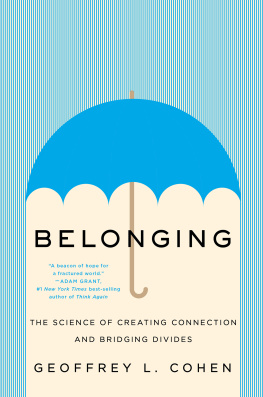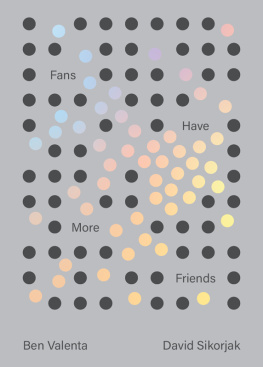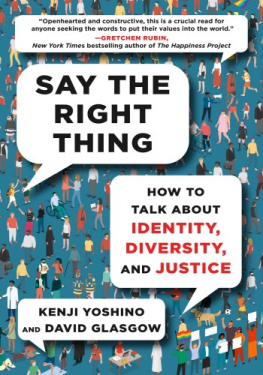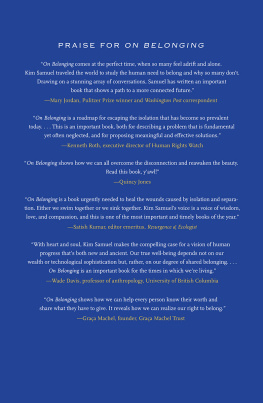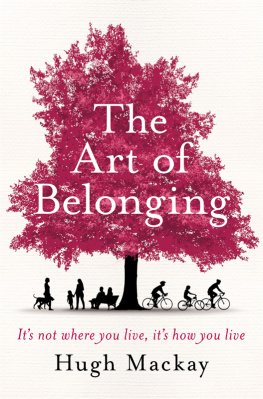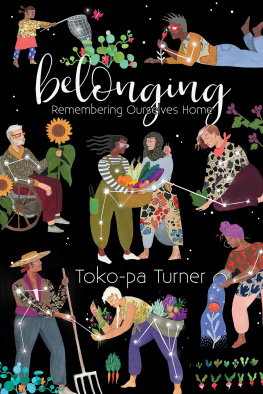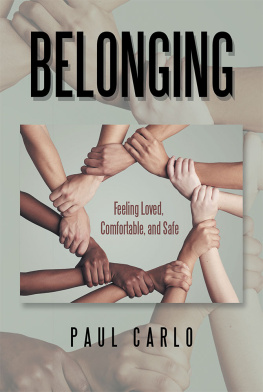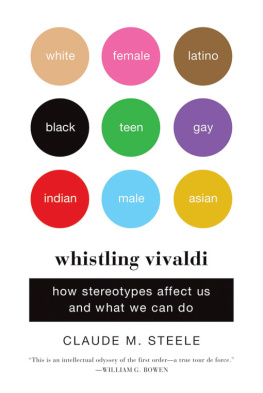Contents
Guide

Belonging
The Science of Creating Connection and Bridging Divides
Geoffrey L. Cohen

Copyright 2022 by Geoffrey L. Cohen
All rights reserved
First Edition
For information about permission to reproduce selections from this book, write to
Permissions, W. W. Norton & Company, Inc., 500 Fifth Avenue, New York, NY 10110
For information about special discounts for bulk purchases, please contact
W. W. Norton Special Sales at specialsales@wwnorton.com or 800-233-4830
Jacket design: Gregg Kulick
Book design by Lovedog Studio
Production manager: Julia Druskin
The Library of Congress has cataloged the printed edition as follows:
Names: Cohen, Geoffrey, L., author.
Title: Belonging : the science of creating connection and bridging divides / Geoffrey L. Cohen.
Description: First Edition. | New York : W. W. Norton & Company, [2022] | Includes bibliographical references and index.
Identifiers: LCCN 2021061609 | ISBN 9781324006183 (hardcover) | ISBN 9781324006190 (epub)
Subjects: LCSH: Belonging (Social psychology)
Classification: LCC HM1111 .C637 2022 | DDC 302.5/45dc23/eng/20220215
LC record available at https://lccn.loc.gov/2021061609
W. W. Norton & Company, Inc., 500 Fifth Avenue, New York, N.Y. 10110
www.wwnorton.com
W. W. Norton & Company Ltd., 15 Carlisle Street, London W1D 3BS
For Mom, Benie, and Emrey
Contents
T HROUGHOUT MY YEARS AS A SOCIAL PSYCHOLOGIST, I HAVE learned how important a sense of belonging can be. Today, many people who once took that feeling for granted seem unmoored and adrift. In the turbulent election season of 2016, my colleagues and I conducted a survey of law school students at a selective university to determine who felt most alienated on campus. The two groups who felt least like they belonged were black women and politically conservative white men. These two groups seem to fall at the farthest poles of our political discourse. Yet they shared a feeling: They felt like outsiders. The defining feature of our era seems to be that few groups feel confident in their sense of belonging.
Belonging may seem like a comfortable but inessential luxury. However, it has potent, wide-ranging effects. We all know the sting of feeling as though were unwelcome at work or school, at a party or a bar, or even in brief encounters in a checkout line or with a rude waiter in a restaurant. Feeling excluded is experienced in much the way physical pain is, with both activating many of the same neural networks in the brain. saying people are as motivated to alleviate it as they are to slake thirst and find shelter.
Research shows that , such as glimpsing pictures of people who care about us, can have far-reaching benefits. They raise our sense of well-being and self-worth, improve our performance, lessen our defensiveness and hostility, increase our tolerance of outsiders, and make us more compassionate. We become more humane.
This book will show how a sense of belonging isnt just a by-product of success but a condition for itin school, work, homes, health care settings, negotiations, politics, community policing, and virtually every domain in which humans deal with other humans. The book will also show that there are a number of small, specific steps, backed up by social science, that we can take to nurture a sense of belonging in ourselves and others.
Finding ways to foster belonging has become an urgent social mission. The feeling of being different, a stranger in a strange land, and even
About that were aware of in terms of all-cause mortality, says genomics researcher Steve Cole of UCLA medical school, defining it as the extent to which people feel disconnected from the rest of humanity. Most of us understand the risk of exposure to radiation, cigarette smoke, and other physical toxins, but we find it harder to appreciate the power of social-psychological toxins. Chronic loneliness is as destructive to our bodies and health as smoking a pack of cigarettes a day.
As Americans have become disconnected from their community and society, they have suffered what Angus Deaton and Anne Case call The researchers discovered that in 2017, 158,000 Americans died either through a slow process of addiction to alcohol, painkillers, or other drugs or through suicide by gunshot or overdose. Thats the equivalent of three full 737 MAXs falling out of the sky every day, with no survivors, they write. The number of these deaths has been rising over the past two decades, and Deaton and Case argue that the increase is due in large measure to the social pain of feeling disconnected.
Social pain is also felt by refugees around the world, whose numbers have swelled so much since 2015 that they now make up 1 percent of the global population. When the Somali novelist Nuruddin Farah and could no longer return to the place where he had grown up, it was as if his very sense of self had been shattered. In that instant, I felt at once displaced and incredulous, as though a mirror had broken. Eventually I would ask myself if on account of what had taken place, I became an other.
The crisis of belonging is . Some Americans believe that members of the opposing political party are out to destroy the nation. In 2016, my colleagues and I found that 15 percent of each political party saw the other side as a terrorist threat. According to political scientists Nathan Kalmoe and Lilliana Mason, about the same percentage in each party said violence would be justified if the opposing party were to win the 2020 election. Forty percent said supporters of the other side were downright evil.
The joy and sense of meaning that people find in social bonds are exploited by hate groups, whose activities are on the rise. in the United States in 2019, and the number of hate groups in America has more than doubled since 2000.
Many and undermine belonging: racism, sexism, and other institutionalized biases; a media that monetizes fear; a social media that has made much of social life performative and voyeuristic rather than authentic; a rise in individualism; economic policies that exacerbate inequality and poverty; unemployment, low wages, and job insecurity; homelessness and eviction; violent neighborhoods; lack of educational opportunity; weakened ties to churches, families, and other social institutions; political polarization; and so on.
These powerful societal factors can leave us feeling hopeless, but science suggests that each of us can combat them. How? The answer is surprisingly simple: by changing the situation we are in, sometimes even in the smallest ways. Our ability to do so is like a superpower.
In spite of the toxicity of our politics, the betrayals and traumas of our past, and the hostilities and injustices in the wider world, many of us have experienced how a single relationship and even a single encounter can be a powerful and healing source of belonging. While I was studying social psychology, I worked in group homes and tutoring programs for disadvantaged teens and adults. An experience I had mentoring a man named Mike taught me to appreciate the power of even a brief encounter as a source of belonging.
Mike lived in a group home and was trying to piece his life back together after a suicide attempt. He had tried to hang himself but was cut free before he died, though not before his brain had been starved of oxygen, causing damage to his hippocampus, the seat of memory. After that trauma, he had trouble forming new memories. He would often forget we had a scheduled outing, but hed always happily come along nonetheless. He appreciated that these little excursions provided him the opportunity to integrate himself into the wider world. One of our outings made a lasting impression on me. Mike wanted to go shopping for audio equipment, and though I knew he didnt have the money, I drove him to a store. Once inside, Mike asked to speak to a salesperson, and I watched the scene unfold with trepidation. I knew it would be clear to any salesperson that Mike was somehow off. He asked the same questions over and over, and he had trouble forming coherent sentences, let alone carrying on a conversation. But that day Mike was lucky enough to be paired up with a young salesman who exemplified openness, patience, and respect.

